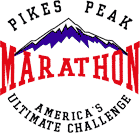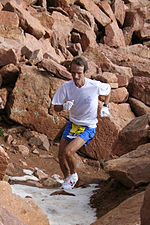Pikes Peak Marathon
| Pikes Peak Marathon | |
|---|---|
 | |
| Date | Augustine's |
| Location | Manitou Springs, Colorado, USA |
| Event type | Road/trail |
| Distance | Marathon and half-marathon |
| Established | 1956 |
| Course records | Ascent: 2:01:06 (M), 2:33:31 (F); Marathon: 3:16:39 (M), 4:15:18 (F)[1] |
| Official site | www.pikespeakmarathon.org |
The Pikes Peak Ascent and Marathon is a racing event that begins at the base of Pikes Peak, in Manitou Springs, Colorado, and climbs over 7,815 feet (2382 m) to the top of the 14,115 foot (4302 m) peak. Since 1966, the event takes place each year in late summer, with the Ascent taking place on Saturday (slightly longer than a half-marathon, at 13.3 miles), and the round-trip marathon on Sunday.
Course
Because of the nature of the run (dirt trails, rock, and other natural obstacles) and the high altitude, the race is much more difficult than standard 42.195-kilometre (26.219 mi) marathons. Winning times for the marathon are typically just under four hours (compared to elite "flatland" marathon times of just over two hours). Although the average grade of the slope is 11%, some sections are much steeper because the central portion of the race is relatively flat. The initial three miles (5 km) are very steep. The central 7 miles (11 km) start as rolling terrain, but become progressively steeper toward the end. The top 3 miles (4.8 km) are above timberline and require some rock scrambling to reach the summit. Oxygen levels drop progressively as altitude rises, further compounding the uphill ordeal.
Winning race times differ significantly from year to year, often depending on weather and trail conditions. Some races have been associated with hot, dry conditions, and others have been associated with snow and cold at the top of the peak.
The race attracts hundreds of runners for both the ascent and for the round-trip. The USDA Forest Service limits the number of runners to 1,800 for the ascent and 800 for the marathon, and the race registration typically fills in one or two days.
History

On Aug. 10, 1956, Dr. Arne Suominen of Del Ray Beach, Fla., challenged smokers and nonsmokers to race up and down Pikes Peak, a 26-mile (42 km) race, in conjunction with the 150th anniversary of the discovery of America's most famous mountain by Zebulon Montgomery Pike. He enlisted 58-year-old real-estate salesman and holistic-lifestyle practitioner Rudy Fahl as the race director. The 56-year-old Suominen, a former Finnish marathon champion and outspoken critic of tobacco, wanted to prove that smoking diminished one's physical endurance. Of the 13 runners that accepted the challenge, only three were smokers. Lou Wille, champion of two Pikes Peak races in the late 1930s and a two-pack-a-day smoker, was likely to be the biggest threat to Suominen's hypothesis. . . .[2]
Although he had beaten Suominen to the summit, Wille was disqualified for not finishing the race. In fact none of the smokers completed the round trip. "I think I've proven my point," Suominen said afterwards. "I finished the race and none of the smokers did." . . .[2]
It was widely rumored that Jecker's motivation came from an American Tobacco Association offer to reward a victorious smoker with a tidy sum of $20,000.[2]
The Pikes Peak Marathon was the first American marathon to allow female competitors, allowing them from the beginning of the marathon in 1956, although no woman entered until 1958.[3] In 1959, Arlene Pieper became the first woman to officially finish a marathon in the United States when she finished the Pikes Peak Marathon.[3] Her daughter Kathy aged 9 became the youngest competitor at that time to finish the race to the summit; however, she did not finish the whole marathon.[4][5]
In 1966 a well-organized marathon was initiated, making the race the third-oldest marathon in the United States.[6]
The Pikes Peak Ascent race has twice incorporated the World Long Distance Mountain Running Challenge competition, first in 2006 then again in 2010.[7][8]
Winners
The following table shows the official winners of the marathon.[1] Course records are highlighted with green background.
The race was lengthened by 1.1 miles in 1976, so that 7–8 minutes must be added to the pre-1976 times for comparison purposes.[9]
The most successful male and female athletes in the history of the marathon are Matt Carpenter, outright record holder and winner of the marathon on twelve occasions between 1988 and 2011, and Erica Larson, who has won the women's race five times.[1] Carpenter won six times in a row in 2006-2011, as did Steve Gachupin in 1966-1970. Larson won four times in a row in 1999-2002, as did Danelle Ballengee in 1994-1997.[1]
On the female side it is worth noting that the course record was set by Lynn Bjorklund already in 1981, with a time of 4:15:18 and an ascent time of 2:33:31. With the exception of the very first years for each sex the winning times have not improved over the years.[10]
| Year | Country | Man | Time | Country | Woman | Time |
|---|---|---|---|---|---|---|
| 2014 | Marc Lauenstein | 3:37:21 | Anita M Ortiz | 5:00:54 | ||
| 2013 | Touru Miyahara | 3:43:23 | Stevie Kremer | 4:17:10 | ||
| 2012 | Kilian Jornet Burgada | 3:40:26 | Emelie Forsberg | 4:28:07 | ||
| 2011 | Matt Carpenter | 3:48:08 | JoAnna C Masloski | 5:09:38 | ||
| 2010 | Matt Carpenter | 3:51:34 | Keri A Nelson | 4:34:24 | ||
| 2009 | Matt Carpenter | 3:37:02 | Anita M Ortiz | 4:28:20 | ||
| 2008 | Matt Carpenter | 3:36:54 | Keri A Nelson | 4:39:00 | ||
| 2007 | Matt Carpenter | 3:48:41 | Salynda E Fleury | 5:00:42 | ||
| 2006 | Matt Carpenter | 3:33:07 | Emma J Murray | 4:21:09 | ||
| 2005 | Fulvio Dapit | 3:58:49 | Corinne Favre | 4:31:20 | ||
| 2004 | Galen Burrell | 4:00:04 | Erica Larson | 4:28:27 | ||
| 2003 | Matt Carpenter | 3:43:46 | Angela Mudge | 4:19:38 | ||
| 2002 | Jesse T Rickert | 4:10:15 | Erica Larson | 4:41:53 | ||
| 2001 | Matt Carpenter | 3:53:53 | Erica Larson | 4:49:10 | ||
| 2000 | Stephen D Smalzel | 3:54:46 | Erica Larson | 4:50:37 | ||
| 1999 | Stephen D Smalzel | 3:49:09 | Erica Larson | 4:46:01 | ||
| 1998 | Matt Carpenter | 3:44:27 | Mariko Shirazi | 4:54:34 | ||
| 1997 | Ricardo Mejía | 3:30:55 | Danelle Ballengee | 4:43:46 | ||
| 1996 | Ricardo Mejía | 3:29:22 | Danelle Ballengee | 4:36:52 | ||
| 1995 | Ricardo Mejía | 3:21:32 | Danelle Ballengee | 4:38:55 | ||
| 1994 | Martin Rodriguez | 3:35:04 | Danelle Ballengee | 4:24:38 | ||
| 1993 | Matt Carpenter | 3:16:39 | Karen E Gorman | 4:42:03 | ||
| 1992 | Ricardo Mejía | 3:24:25 | Jo H Gathercole | 4:44:15 | ||
| 1991 | Stephen D Smalzel | 3:46:43 | Deborah Wagner | 4:45:59 | ||
| 1990 | Ricardo Mejía | 3:35:03 | Cylinda Engelman | 4:44:18 | ||
| 1989 | Matt Carpenter | 3:39:26 | Linda Quinlisk | 4:41:51 | ||
| 1988 | Matt Carpenter | 3:38:05 | Linda Quinlisk | 4:29:59 | ||
| 1987 | Sheldon A Larson | 3:41:56 | Gail Ladage Scott | 4:26:59 | ||
| 1986 | Stan W Fox | 3:41:57 | Margie Loyd-Allison | 4:55:43 | ||
| 1985 | Creighton J King | 3:39:39 | Linda Quinlisk | 4:37:32 | ||
| 1984 | Wesley Smith | 3:39:00 | Gail Ladage Scott | 4:48:26 | ||
| 1983 | Creighton J King | 3:39:50 | Margie Loyd-Allison | 4:39:59 | ||
| 1982 | Al Waquie | 3:29:53 | Gabrielle Andersen | 4:25:13 | ||
| 1981 | Al Waquie | 3:26:17 | Lynn Bjorklund | 4:15:18 | ||
| 1980 | Chris G Reveley | 3:45:52 | Linda Quinlisk | 4:38:00 | ||
| 1979 | Chris G Reveley | 3:39:08 | Sue Gladney | 4:42:45 | ||
| 1978 | Ken Young | 3:50:44 | Donna L Messenger | 5:08:08 | ||
| 1977 | Rick Trujillo | 3:46:21 | Ellen O'Connor | 5:50:09 | ||
| 1976 | Rick Trujillo | 3:34:15 | Donna L Messenger | 5:05:40 | ||
| 1975 | Rick Trujillo | 3:31:05 | Joan Ullyut | 5:20:21 | ||
| 1974 | Rick Trujillo | 3:36:40 | Marcia Trent | 5:23:10 | ||
| 1973 | Rick Trujillo | 3:39:46 | Joan Ullyut | 5:28:00 | ||
| 1972 | Chuck Smead | 3:44:21 | Isa C Varela | 7:25:00 | ||
| 1971 | Steve Gachupin | 3:46:26 | Joyce Swannack | 7:07:36 | ||
| 1970 | Steve Gachupin | 3:45:52 | ||||
| 1969 | Steve Gachupin | 3:44:50 | ||||
| 1968 | Steve Gachupin | 3:39:47 | ||||
| 1967 | Steve Gachupin | 3:58:51 | ||||
| 1966 | Steve Gachupin | 3:57:04 | ||||
| 1965 | John R Rose | 3:53:57 | ||||
| 1964 | Donald Lakin | 4:03:33 | ||||
| 1963 | John R Rose | 4:01:22 | ||||
| 1962 | Robert Mohler | 4:10:03 | ||||
| 1961 | Calvin Hansen | 4:07:15 | ||||
| 1960 | Calvin Hansen | 4:14:25 | ||||
| 1959 | Calvin Hansen | 4:20:18 | Arlene Pieper | 9:16:00 | ||
| 1958 | Calvin Hansen | 4:29:40 | ||||
| 1957 | Monte Wolford | 5:15:53 | ||||
| 1956 | Monte Wolford | 5:39:58 |
See also
References
- ^ a b c d "Pikes Peak Ascent & Marathon Results, Records & Statistics". Pikes Peak Marathon. Retrieved 22 May 2015.
- ^ a b c Galvin, J. III (August 2006), "Peak Experience", Runner's World, 41 (8): 94
{{citation}}: CS1 maint: year (link) - ^ a b "The mystique of Pikes Peak". Pikes Peak Marathon. Retrieved 22 May 2015.
- ^ "The Big Race". Arlene Pieper. Retrieved 23 May 2015.
- ^ "1959 Pikes Peak Marathon". Pikes Peak Marathon. Retrieved 23 May 2015.
- ^ "Oldest marathons in the United States". Association of Road Racing Statisticians. Retrieved 22 May 2015.
- ^ Hughes, Danny (2006-08-21). Carpenter, Murray Victorious at WMRA Challenge at Pikes Peak. IAAF. Retrieved on 2011-06-23.
- ^ Bruno Gozzelino and Nancy Hobbs. Triumph of USA athletes at 7th World Long Distance Mountain Running Challenge in Colorado Springs. WMRA. Retrieved on 2011-06-23.
- ^ "1975 Pikes Peak Marathon". Pikes Peak Marathon. Retrieved 22 May 2015.
- ^ "Pikes Peak Ascent and Marathon Winners". Pikes Peak Marathon. Retrieved 22 May 2015.
External links
